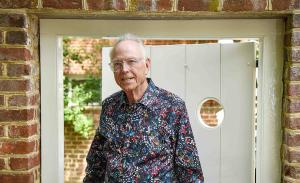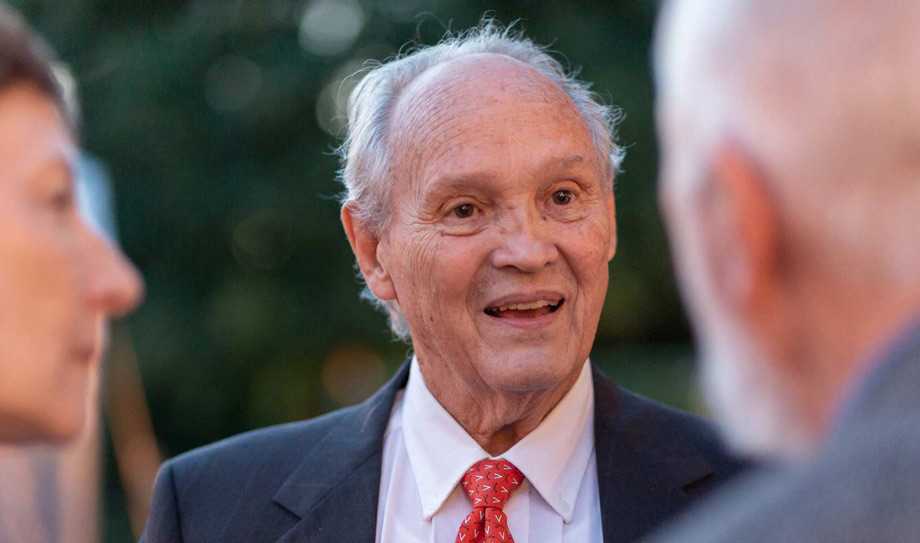
Meet Gregory Olsen, an American entrepreneur and scientist whose life story is nothing short of extraordinary. Most famously known as the third private citizen to venture into space, Olsen's incredible journey began with a Ph.D. in materials science and engineering from the University of Virginia’s School of Engineering and Applied Science in 1971.
Olsen made history as the third-ever private citizen to travel into space aboard the Russian Soyuz TMA-7 spacecraft. During his 10-day journey, Olsen conducted scientific research and became one of the few humans to experience the awe-inspiring view of Earth from space.
Even with this distinction, Olsen is just as well known for his impressive entrepreneurial background. He co-founded two multi-million-dollar companies: EPITAXX, a fiber-optic detector manufacturer, and Sensors Unlimited, a near-infrared camera manufacturer – a company that was sold for a whopping $600 million.
Olsen is also admired for his generous philanthropy. He has made the biggest-ever donation to the School of Engineering and gives to the Deborah Heart and Lung Hospital, among other charitable causes.
In Jan. 2023, he became an inaugural member of the University Fellows Program, appointed by President James Ryan with sponsorship from the School of Engineering. This UVA initiative brings expert practitioners from a variety of fields to the UVA community of students with living quarters on the Lawn.
We asked him to talk with us about some of his experiences and latest activities.
Q. As a UVA alumnus and University Fellow, what is it like to be on Grounds?
A. It's been a fantastic experience. I am back after 52 years to where it all started. I'm living on the Lawn in the upper Mews. Just to have the feel of the University all around me, it’s awe-inspiring.
For my connection to the student community, I decided to focus on entrepreneurship since that's what I do now and what I've been doing for the last 25 years. I've been bringing in invited speakers, people who are proven entrepreneurs and many of them UVA alumni. They’re all trailblazers. Their perspectives and experiences show some of the different pathways to entrepreneurship for the students.
I have two grandsons here. They're third- and fourth-year engineering students, so I get to spend a little time with them. And I get to interact with my old department and my old advisor, Bill Jesser.
Q. You've had tremendous achievements in the business world. What advice would you give to students who are interested in entrepreneurship and pursuing a career in the high-tech field?
A. Just follow your dreams. It's not easy. In fact, it's very hard.I like what Ben Calhoun from [UVA] electrical engineering said in a recent talk. He's both a professor and an entrepreneur, and he started a highly successful business in semiconductors. In the first five minutes of his talk, he listed all the reasons why you shouldn't start a business. He said that if you can get past all this, maybe you will have a shot.
When I started my first business, it was like I finally found myself at age 38. I knew this is what I want to do in life, and I didn't care that I had to work from 8 a.m. until 10, 11 o'clock at night. I loved it.
Even with all that, there are times when you're going to wonder, maybe I should give this up. But a true entrepreneur will just keep plugging away despite all the negative feelings.
Q. How do you think students can best prepare for the challenges of the 21st century?
A. Real simple. Don't give up! As each generation comes of age, the people in my generation remark on how tough it was for us when we were young, and how it's so easy for you. That’s the one thing I think that may be slipping over time — persistence. Sometimes, you may have a moment where you think you can't solve a problem or you can't deal with a situation. Take a breath, think about it. People are often looking for some magic solution, and the truth is, there isn't any magic solution. Just hang in there and don't give up, and things will change.
In high school, I was a bit of a character, a lot of misbehavior. I got suspended a couple of times. I failed trigonometry in my senior year. How I was able to get into an engineering school the following semester is another long story by itself, how I made up trigonometry in summer school. Again, it goes back to ‘Don't give up.’
Q. Looking back at your time at the University, what elements or experiences helped lay the groundwork for your business success?
A. I was taught how to do presentations and how to write. I was here from 1968 to 1971. Back then, engineers weren't expected to communicate that well, you just did your experiments and showed your results. Well, Bill [Jesser] wasn't having any of that. I was lucky that I was his first student he advised. I would give him a draft of something I wrote, and it would come back all marked up in red! It annoyed me at the time, but now I think, 'Wow, how lucky I was that somebody cared enough." As I developed, I became a pretty good proposal writer and communicator. I can trace that back to the many, many hours that I spent together with Bill.

Q. Your gifts to the school of engineering are extremely generous. Would you tell us about the motivation behind it?
A. I want to advance the University and do whatever I can to help the School of Engineering and the University prosper. I am very aware that I wouldn't be sitting in this chair talking to you without UVA and the education I got here. I mentioned how Bill Jesser was so important to me. Doris and Heinz Wilsdorf, who I had as professors, were also a huge influence on me. I worked hard and I think I deserve a certain amount of my success, but luck goes along with it. I've been very lucky in the business world, so why not share it with the people who got you there? I feel an obligation, not like I should be thanked or catered to.
Q. We have heard that you engage in outreach activities and deliver talks about your experiences at high schools. Could you provide further details about this?
A. I've given over 700 talks, primarily to inner-city schools. I hope I can push that to over a thousand. I live in the town of Princeton. It's a great place to live, but they don't need me there. There's plenty of support for youth in Princeton. But if you go 20 miles away to the city of Trenton, they do need me there, so that's what I try to focus on. If I can motivate just one person out of 20 or 30, it’s worth it.
It was one of the goals of going into space. Obviously just going there is a big goal, but I wanted to share it with people, not just sit in a chair and maybe write a book — which I've done! When I was up there, I said, ‘Wow, what a wonderful experience for a guy from New Jersey who didn't do well in high school and flunked trigonometry in his senior year.’ I impart this to the kids [in Trenton]. I let them know that not everyone is a straight-A genius that gets to do this.
Q. What was the hardest thing and the best thing about the International Space Station trip?
A. I trained for two years in Russia before the trip. For an engineer, it's pretty easy to pick up the technical aspects of the training. You do leak checking of vacuum systems and operate radios and computers. But for me, learning the language was the toughest part. The whole program was in Russian.
Liftoff was probably the best thing. In my first attempt at getting to the ISS, I had a medical disqualification. It was a minor thing, but it cost me an extra year. When I went to go up again, my concern was that I would be on the rocket launch pad and someone would say, ‘Sorry, guy, you can't go. Your heart rate isn't correct.’ So, when we were sitting in that rocket when it finally started shaking and we took off, I wasn't afraid. I was thinking, ‘Yes! The next 10 days belonged to me, no matter what happens.’ I did well in zero gravity. I didn't get any motion sickness. I just enjoyed the whole trip.
As a result of Olsen's work, he has received numerous accolades throughout his life. Among them are the Explorer's Club, NASA Space Flight Medal and the Ellis Island Medal of Honor. He is a fellow of the Institute of Electrical and Electronics Engineers and was elected to the National Academy of Engineering – the profession’s highest honor.
Olsen founded GHO Ventures, LLC, where he currently serves as President and CEO.